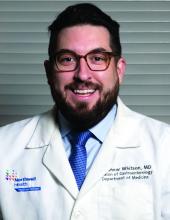Matthew Whitson, MD, MSEd (lead host)
Walk us through your current GI role and your path to getting there:
I am currently the GI fellowship director at Hofstra-Northwell, by way of Mount Sinai in New York City for medical school and residency and the University of Pennsylvania, Philadelphia, for GI fellowship. I’m about 60:40 clinical and scholarship. My clinical focus is in esophageal and swallowing disorders, which came about because of mentorship and clinical exposure while at UPenn. During my fellowship, I also got a master’s in medical education again because of the tremendous sponsorship from the faculty and leadership. I have educational roles in the medical school, the internal medicine residency, and, of course, the GI fellowship.
What is your favorite part about your current role? Least favorite part?
Favorite part: working with students and trainees. When you see a medical concept click for them and then see them apply that concept, or that skill, into practice it is incredibly rewarding. Least favorite part: the amount of written documentation needed to run a fellowship.
What are your interests outside of work?
I love going to see live music in New York and touring the museums of New York, preferably the MOMA, or getting to Storm King (an expansive sculpture garden) outside of the city when we can. Anytime we can get outside to go hiking or play golf is a good day.
What advice would you give to…
- Someone who matches into GI on Dec. 2: Celebrate; you’ve earned it! Those projects you started during residency – finish them now. Otherwise, it’s super hard to get them done during fellowship, especially if you are training at a different institution for GI fellowship.
- Someone who just graduated from GI fellowship: Negotiate that contract, and then negotiate it again. Have a budget, and don’t spend that “attending money” on anything major for at least 6 months.
How do you see the future of GI changing as a new generation of trainees enters the workforce?
The way we access information is changing. Everything is at the tip of your fingers at any time, so much so, it can be overwhelming. I think that learning how to critically appraise and access clinically appropriate data is a skill that everyone will need going forward. I think it will take an even more central role in our medical education. Beyond this, the importance of shared decision-making with your patients will continue to increase in the world of personalized medicine, as will the assortment of noninvasive testing options.
Why did you want to host this podcast?
Reading about mentorship, sponsorship, career development, etc. is important, but it doesn’t do these topics justice. It is such a nuanced thing and talking about it, exploring it, teasing it out is just so fun. Plus, I was a radio DJ when younger and have always dreamed of doing something in the audio medium as a professional.
What’s your favorite episode so far?
I won’t say favorite, but I think the Laurie Keefer episode is up there. It was such a nice conversation about a challenging concept: Building resilience in our trainees and ourselves. I learned a lot from her and have begun integrating some of these skills into my work as a program director.
What’s the best piece of advice you’ve gotten that’s helped you in your career so far?
I’m going to adopt this from a mentor of mine, but it’s the “me or my family rule.” What would you want done if the patient in front of you were your family member? If you keep that as your “True North,” then I think you are off to a good start as a clinician.




